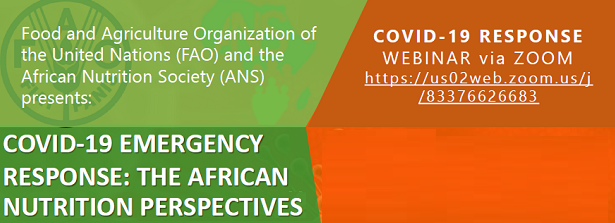
The Food and Agriculture Organization of the United Nations (FAO) and the African Nutrition Society (ANS) present a webinar entitled “COVID-19 emergency response: the African nutrition perspectives” on June 1, 2020 at 09:00 GMT (11:00 Dutch time).
Background
The COVID-19 pandemic is devastating the world at a time when more than 820 million people are still hungry globally. In Sub-Saharan Africa (SSA), there are still 239 million people that are undernourished (translating to a prevalence of 22.8%) Prevalence of Undernourishment (PoU), is an SDG 2 indicator, with a target is to reduce to zero by 2030. Unfortunately there has been no significant reduction in the PoU since 2017 and these trends are mostly driven by a combination of factors, including conflicts and extreme weather events, and high level of food insecurity currently affecting a number of countries in Africa. According to the latest FIES-based food-insecurity estimates, 9.2 percent of the world population (or slightly more than 700 million people) were exposed to severe levels of food insecurity in 2018, with Africa having the highest level of food insecurity of 27%. Africa remains a laggard in almost all the nutrition indicators, including access to safe and clean drinking water.
COVID-19 is not only a health problem, it is also causing global economic and social crisis of unimaginable proportions. In Africa, the negative impact of COVID-19 will likely be worse given the economic situation of the continent. Currently, many countries have imposed total or partial lockdowns, limiting the movement of people and shutting down businesses that are considered non-essential. Most, if not all, of the African countries, have prioritized food supply chains as a key sector to go on uninterrupted. Financial services, including social protection schemes, have been given the green light to operate as well; and internet and mobile money banking systems are being reinforced. However, disruptions in the food systems are investable. Economic slumps worsen household income, and the ability to acquire food. Increasing food prices are often a feature of such pandemics, which is felt acutely by poor households. The informal sector and households that depend on day-to-day informal activities for their income are already hard-hit.
Given the unprecedented nature of the crisis, it is empirical to create a better understanding of the potential impacts of COVID-19 and take rapid collective action to pre-empt its impact on food security and food systems through engagements with different scientific professional bodies such as the Africa Nutrition Society (ANS). Therefore, FAO RAF in collaboration African Nutrition Society are jointly organising this webinar to provide a platform for experts to share evidence and views on how to enhance better food system and improve nutritional health among Africans despite the COVID-19.
Webinar
The general objective of the webinar is to contribute to the improvement of food systems in the face of the COVID pandemic and to address the emerging issues of food insecurity in Africa.
Specifically, the webinar will:
- Discuss the medium and long term impact of COVID-19 on food poverty; nutrition and food systems in Africa and to deliberate on the key contributing factors
- Assess the challenges faced by the emergency response on food systems;
- To discuss opportunities for transforming the food systems and improve nutrition during the current and future pandemics.
- To discuss measures put in place for social protection and COVID-19 response in Africa, especially in rural areas, and to share experience of integrated best practices, and approaches.
- Discuss research opportunities related to nutrition and COVID-19 and how they can be adapted to address the impact of COVID-19 in Africa.
Please Join Webinar via https://us02web.zoom.us/j/83376626683
- This event has passed.

